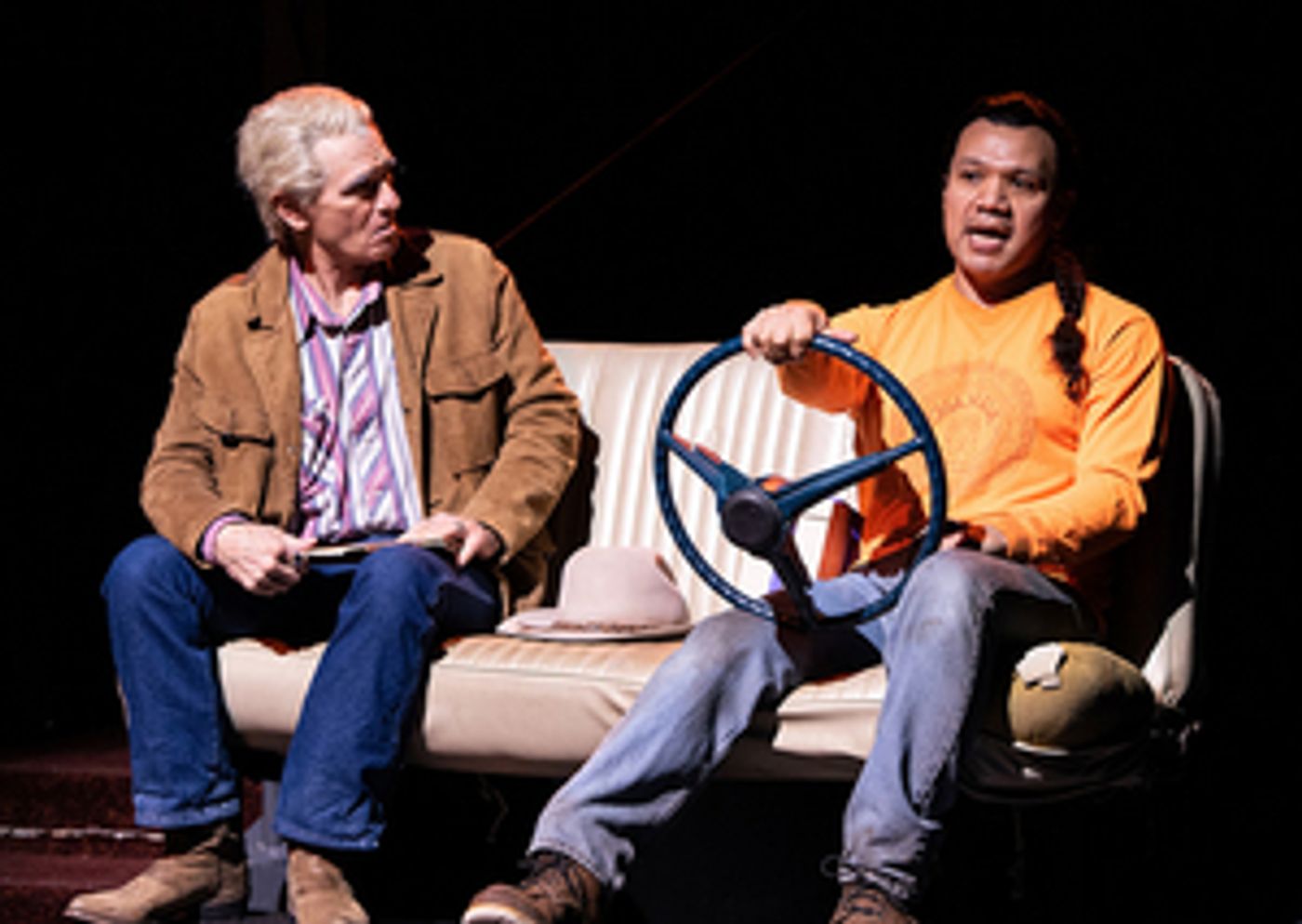Review: MOTHER ROAD at Arena Stage

By 1939. the Depression had begun to wane, but Dorothy still took a road trip to Oz to find out that there's no place like home. John Steinbeck published The Grapes of Wrath that year; the Joad family also had to leave their Oklahoma home and hit the road because the Dust Bowl was no Miss Gulch nor a dream they'd wake up from. Steinbeck called the road they took, Route 66, the Mother Road which has given Octavio Solis his title for Arena's current production through March 8.
Mother Road, more than being a sequel to Steinbeck, reverse-engineers The Grapes of Wrath from present-day California back to Sallisaw, OK. A descendant of Tom Joad (who rather adorably carries with him a photo of Henry Fonda as the character) has come to California to find other surviving members of his family. By the time he does and returns to Sallisaw with an ark full of companions, a new concept of home and family has been crafted. And Tom Joad's own notion that "I'll be everywhere" continues to be true.
Helen Hayes Award winning director Bill Rauch masterfully leads a team of nine outstanding actors, six of whom play a kind of Greek chorus and multiple roles (some of which are vending machines and gas pumps); and everybody wrangles Cesar, the Pickup Truck-uncredited in the program but almost as alive as any human character in Mother Road. Hey, there's a road trip in this play, and there has to be a vehicle. (Set Design by Christopher Acebo.)
Actor Mark Murphey probes William Joad, a complex senior citizen who is trying to restore what order he can to the Joad family history while he's still able. Murphey makes Joad a Lear-like figure-raging at storms both internal and interpersonal. The young people just call him "The OG." That rage runs in the family is vividly reflected in Tony Sancho's dynamic performance as Joad's potential heir, Martin Jodes. "Tino's" rage often manifests at conspicuously risky moments in his life, such as during traffic stops or when he has a really important date with his girlfriend (played by the gifted Natalie Camunas who gives Amelia both sweetness and grit). But Tino's no cardboard "angry young man." His sense of right and wrong came from his Mami who was named after Tom Joad's sister, Rose O'Sharon. During the trip, William Joad discovers how alike he and Tino are in many more good ways than they differ. And a further measure of Martin Jodes' goodness comes from the friends he brings along as he and William follow the black asphalt road. His gay "cousin," Mo, complements his impulsiveness with an OG's wisdom of her own (it takes one to know one), and Mo's raucous sense of humor helps her to be an occasional and necessary peacemaker between Tino and William Joad. (Amy Lizardo owns the role of Mo the way Henry Fonda owns Tom Joad.) Cedric Lamar plays another friend of Tino, James. They met when they were in trouble with the law; James proves that once in a while, incarceration positively changes a person. Lamar's James brings the considerable energy it takes to argue with Sancho's Tino and actually win the argument.
At times, the interludes for the chorus which Solis has created, most spoken, some sung, disrupt the narrative. To be sure, the playwright often uses these interruptions to build suspense or to add details. But more often than not, Solis brakes his characters or their stories mid-thought or mid-event, and the plot stoppages can seem like a tease. On the other hand, without the chorus, who would drive Cesar, the Pickup Truck so effectively around the four corners of the Fichandler stage?
Also, Mother Road can potentially cause a kind of audience fatigue (though it's a swift 2.5 hours in length) because of Solis' "box checking." The play contains or refers to racism, gun violence, homophobia, rape, police violence toward minorities, injustice to Native Americans, African Americans, Mexican Americans, migrant laborers, the failure of organized religion; it can be exhausting. Many contemporary American Playwrights hobble their work by trying too hard to write about everything that goes on in America in every play they create. But Mother Road does not just render political correctness for its own sake nor merely depict inclusivity to be up to date. Solis shares Shakespeare's task; both playwrights really see all the world as a stage and the men and women. . .players, so attention must be paid. Universal truths matter, and when Cesar, the Pickup Truck finally reaches Oklahoma, its passengers consist of a Choctaw, a Mexican American, an African American, a lesbian Mexican American, and a seriously ill white man who's destined to soon be a minority in the USA. Noah, too, tried to include everyone on his ark, and history has marked and appreciated that effort. Mother Road gives new meaning to the idea of "blended family."
Complementing Acebo's set, Pablo Santiago's lighting can turn the floor of the Fich into a windstorm, starlight in the country, or the light show produced by car headlamps on a nighttime highway. And Kaitlyn Pietras' projections and videos contribute a wealth of visual information about locations along Route 66, about the weather and the sky.
Tom Joad's underdog optimism and fierce sense of the importance of standing up to injustice matters in 2020 as much as it did in 1939. Mother Road spares no effort to remind an audience to keep the faith.
Find tickets at 202.488.3300 or arenastage.org.
Photo by Margot Schulman
Reader Reviews
Videos

